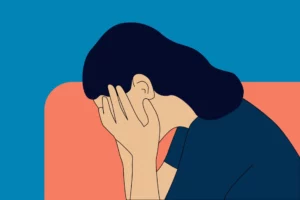Do you have OCD? If so, you’re not alone. OCD is a very common disorder, and there are many ways to get rid of it. In this blog post, we will discuss 15 tips that can help you overcome your OCD symptoms. We will also provide some background information on OCD and how it can be treated. So if you’re ready to get rid of your OCD for good, keep reading!
Contents
- 1 What Is OCD?
- 2 How To Get Rid Of OCD?
- 2.1 Practice mindfulness
- 2.2 Follow a routine
- 2.3 Exercise regularly
- 2.4 Get adequate sleep
- 2.5 Find healthy ways to cope
- 2.6 Eat healthily
- 2.7 Talk to someone
- 2.8 Try cognitive behavioral therapy (CBT)
- 2.9 Take medications
- 2.10 Join a support group
- 2.11 Avoid triggers
- 2.12 Set realistic goals
- 2.13 Take breaks
- 2.14 Try distraction techniques
- 2.15 Keep a journal
- 3 Can OCD Go Away?
- 4 Conclusion
What Is OCD?
 OCD stands for Obsessive Compulsive Disorder. It is a mental disorder characterized by unwanted, intrusive thoughts and emotions (obsessions) that lead to compulsive behavior or rituals. People with OCD may feel compelled to do certain activities repeatedly in order to reduce the anxiety caused by these obsessions.
OCD stands for Obsessive Compulsive Disorder. It is a mental disorder characterized by unwanted, intrusive thoughts and emotions (obsessions) that lead to compulsive behavior or rituals. People with OCD may feel compelled to do certain activities repeatedly in order to reduce the anxiety caused by these obsessions.
According to studies, OCD affects around 1.2% of the population and is one of the most common mental health disorders. It can affect people of all ages, genders, and backgrounds. So, you should know that you are not alone in this journey.
And, it is possible to get rid of OCD if you are willing to work on it. Be sure to seek professional help if you feel overwhelmed. The right time intervention can make all the difference in your OCD recovery journey.
How To Get Rid Of OCD?
If you are someone who has been diagnosed with OCD, it is important to understand that you are not alone. There are many strategies and treatments out there that can help reduce the symptoms of OCD and help you live a more normal life. Here are the top 15 tips to help you get rid of OCD:
Practice mindfulness
The very first step to getting rid of OCD is to practice mindfulness. Mindfulness is a practice that involves bringing one’s attention to the present moment without judgment or interpretation. It can help you become aware of your thoughts and feelings without getting overwhelmed or caught up in them. This can help you gain control of your OCD symptoms by learning to recognize when they start to arise, and then not engaging with them.
Follow a routine
You should also make sure to create and follow a daily routine. Routines can help reduce the amount of stress you experience and can also help you focus on more positive things. For example, you can set a time for when you will do certain activities each day and stick to it. This will help keep your OCD symptoms in check.
Exercise regularly
Exercising can be a great way to reduce stress and help manage OCD symptoms. Regular physical activity will also help to improve your sleep and energy levels, which can reduce the amount of stress you feel. It can also help with relaxation and calming down your mind and body. You can start by doing simple exercises like walking or cycling, and then gradually move on to more intense activities like yoga, running, and strength training.
Get adequate sleep
Getting enough restful sleep is one of the most important steps you can take in order to reduce your OCD symptoms. Make sure to establish a regular bedtime routine and get at least 7-8 hours of sleep each night. In addition, you can also practice relaxation techniques like deep breathing or progressive muscle relaxation before bed.
Find healthy ways to cope
 It is important to find healthy ways to cope with stress and anxiety when dealing with OCD. This could include activities like deep breathing, yoga, meditation, journaling, or spending time in nature. Being mindful of your thoughts and feelings can help you better understand what triggers your OCD and how to manage it.
It is important to find healthy ways to cope with stress and anxiety when dealing with OCD. This could include activities like deep breathing, yoga, meditation, journaling, or spending time in nature. Being mindful of your thoughts and feelings can help you better understand what triggers your OCD and how to manage it.
Eat healthily
Another important aspect of managing OCD is to make sure you are eating a healthy and balanced diet. Eating nutritious meals and snacks can help reduce stress levels and improve your overall mood. This will also help to keep your energy levels up during times when OCD symptoms become overwhelming.
Talk to someone
Having someone to talk to can be incredibly helpful when dealing with OCD. You should consider talking with your family, friends, or loved ones about your condition. As this can help you better understand and manage it. You can also speak with a therapist or counselor if needed, as they can provide you with professional guidance and support.
Try cognitive behavioral therapy (CBT)
Cognitive behavioral therapy (CBT) is a type of psychotherapy that helps you to identify and change negative thought patterns. This can help to reduce the intensity of your OCD symptoms. For example, CBT can help you to identify when and why your OCD symptoms are triggered and then provide ways to better manage them.
Take medications
Certain medications, such as antidepressants or antipsychotics, can be used to reduce the severity of OCD symptoms. As medicines work differently for everyone, it is important to talk with your doctor about which medications are best suited for you. The process of finding the right medication can take some time, so it is important to stay patient and work closely with your doctor.
Join a support group
Joining a support group can be a great way to connect with other people who are dealing with similar issues. It can provide you with a safe and supportive environment to talk about your experiences and receive helpful advice from others. You can find support groups in your local community or online.
Avoid triggers
Avoiding activities, people, or situations that trigger your OCD can help to reduce the frequency and intensity of your symptoms. For example, if you have contamination-related OCD, it may be helpful to avoid touching certain objects that are known to trigger your symptoms. It is important to recognize and practice your avoidance strategies in order to manage your OCD.
Set realistic goals
People might experience OCD differently, so it is important to set realistic goals and expectations when dealing with your condition. Doing things that are too challenging or intimidating can lead to anxiety and frustration. Instead, focus your efforts on achievable goals that are manageable and help to reduce the intensity of your OCD symptoms.
Take breaks
If you find that your OCD symptoms are becoming too overwhelming, remind yourself to take a break. Allow yourself some time away from any activities or stressful situations that may be triggering your symptoms. This could involve going for a walk, listening to calming music, or doing something creative like coloring or drawing. Taking regular breaks can help to reduce the intensity of your OCD symptoms.
Try distraction techniques
As obsessions and compulsions in OCD can be hard to control, distraction techniques can help to direct your focus away from them. This could involve checking the news or reading a book, as this can help to take your mind off of the intrusive thoughts and rituals associated with OCD. You could also try engaging in a different activity or learning a new skill.
Keep a journal
 Finally, keeping a journal can help you to better understand your OCD symptoms. Writing down your experiences and thoughts can provide you with insight into how your condition is affecting your life. You can use this information to track your progress and better manage your OCD. In fact, journaling can be a helpful tool for managing many mental health issues.
Finally, keeping a journal can help you to better understand your OCD symptoms. Writing down your experiences and thoughts can provide you with insight into how your condition is affecting your life. You can use this information to track your progress and better manage your OCD. In fact, journaling can be a helpful tool for managing many mental health issues.
These strategies can help you gain control over OCD symptoms. But there is no one-size-fits-all approach. It is important to work closely with a mental health professional to determine what treatment plan works best for you. With dedication and hard work, you can take steps toward achieving your goals and regaining control of your life.
Can OCD Go Away?
Yes, OCD can go away. But it is important to remember that OCD can be a chronic condition. This means that even if it goes away, there is still the possibility of relapse. Therefore, it’s important to monitor your symptoms and continue with treatment even after you are feeling better.
Additionally, medications and therapy can help reduce the frequency and intensity of OCD symptoms, making them easier to manage. In some cases, it is even possible for symptoms to go away completely with the right treatment plan. Recent studies have shown that cognitive-behavioral therapy (CBT) can be an effective treatment for OCD, with many people reporting improved symptoms after just one session.
It is also important to recognize that recovery from OCD can take time. Some people may experience immediate relief while others may need more time to work through their symptoms. It’s important to be patient and give yourself the time and support you need to manage your condition.
Remember that recovery is possible—it just takes time, patience, and hard work!
Conclusion
In conclusion, get rid of OCD with the right treatment, support, and dedication. It is essential to work with a mental health professional to determine the best course of action for your individual needs. Consider all available treatments, including medication, cognitive behavioral therapy (CBT), or exposure therapy when choosing a plan.
Also, find a mental health provider that you can trust and connect with in order to maximize the effectiveness of treatment. Do not forget to seek support from family and friends to help cope with OCD symptoms more effectively. With the right approach, you can take control of your life and manage OCD in order to lead a happier and more fulfilling life.
For more information and guidance, please contact MantraCare. OCD is a mental health disorder characterized by obsessions and compulsions. If you have any queries regarding Online OCD Counseling experienced therapists at MantraCare can help: Book a trial OCD therapy session


